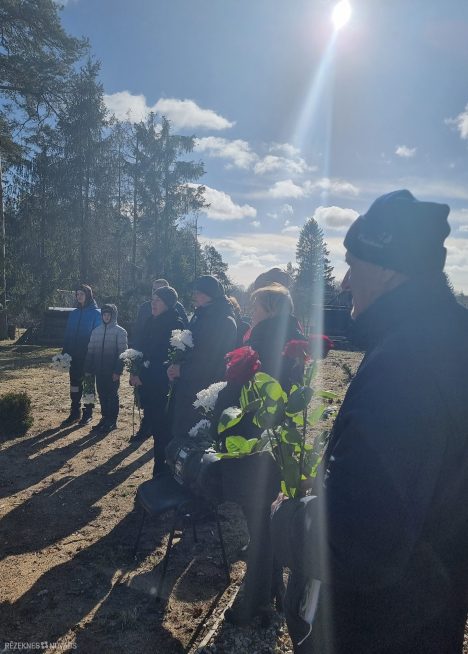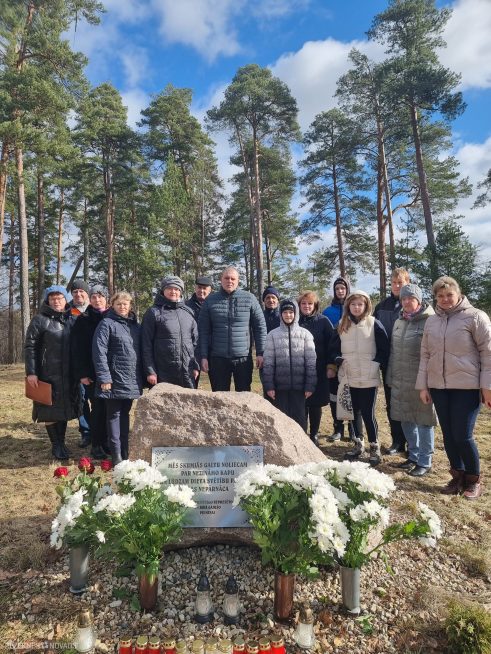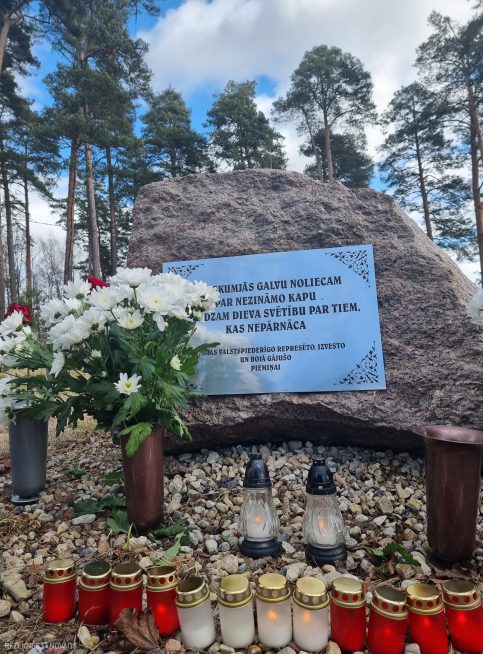SHADOWS OF THE PAST: remembering Silmalas parish repressed
As far as 74 years have passed, we are distinguished from the northday, but more than 42 thousand Latvian people in the fatal days – 25 March 1949, when thousands of Latvian residents were taken away from their homes and their homeland. On 25 March, we put flowers and lit candles on the memorial places in the 1949 repression of all Latvian provinces and cities.
In the area of our Silmalas municipality, thanks to the initiative of the parish former leader John Laizāns, in 2021, at THE site of THE former school building OF Silmalas, in the territory of THE Silmalas village surrounded by old pine trees, a memorial site was installed and a memorial stone repressed memorial was installed. A year later, Rosentov's Holy Cross parish, Rinald Brock, was killed by the memorial site.
Also this year, on a sunny Saturday morning, on 25 March, flowers and lit candles began to appear at the memorial stone. At the time, the representatives of the institutions and the indifferent villages of the village, including Gatis Pučka, head of the administrative head OF THE Maltas association, arrived here. The moments of the memorial event, such as the song “letter to Latvia” under the direction of the “mood” of the voxal ensemble, under the direction of the talented leader of the “mood” in Irinas Scherbacov, the speech of Natalia Valenica, leader of the Cruel Cultural House, and the naming of more than 70 parish-sent words in the metronom sound cover...
It should be noted that there are only three witnesses of the main day events that were deported on 25 March 1949: Alexandra Ostrovska, Vallija Bitajae and Veronica. A. Ostrovska entrusted me to read the story of her family. I offered a small snippet from the little Alexander Ilya memories:
“When i was five and a half years old, i lived with my parents and older sister in a very beautiful place near the Daugava. The father worked with horticulture and vegetable production, we had 3 horses and 4 cows. The nurse went to school, and i was with my parents all the time, and by 25 March everything was fine, there was no sign of happiness. On 25 March 1949, three armed men came to our home and said, Prepare, you will be deported. We were given one hour to pack. My parents thought they wouldn't bring us anywhere, but just take it from home to destroy. And which can be packed in stress situations within 1 hour. True, Mom took one thing – the sewing machine. And despite being very cold, i thought of putting my favorite dress with pink peas. So we took us to the Kalcún railway station, where we saw a train with wagons normally used for the transport of animals. It was worrying and a little reassuring, because it meant that we wouldn't be killed..." Mrs. Alexandre is still an active and respectable parish citizen, thanks to her stories, revealing important facts in our parish history, while on 24 March she met her school pupils and listened to the exciting narrative of the years spent in the parcel.
A lot of time has passed, and the next generations of sent-out successes can be faded by the mention of this tragic history page, so we, the present generation, have a duty to avoid forgetfulness and to advocate the ideals of civil rights. In the end, the people who have survived mass repression, the memorial of these terrible events, is also a sign that the society is prepared to prevent similar events in the future.
THE P.S. says the people of the people about the people who live in rocks, who live if the Scholar gang wins the evil magician. Beyond every memorial, the stone was wakened and the souls. Only they will never return to the chess. It's just a moment to stop, beat my memories, tilt my head. And read the lines in the grey granite on the Silverbank: "We shook my head at the unknown tomb and prayed for God's blessing for those who did not come. The repressed and deaths of all Latvian nationals...”
Prepared by: Natalia Stafecka, Silmalas parish resident





